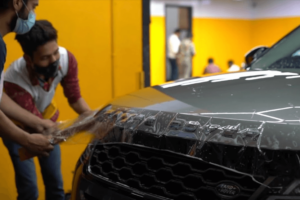When someone expresses interest in buying your car without seeing it, it can be difficult to know whether it’s a legitimate offer or a scam.
While some buyers may be willing to take the risk of buying a car sight unseen, others may have ulterior motives. It’s important to be cautious and take steps to protect yourself when considering these types of offers.
One common scam involves a buyer sending a bad check or promising to wire money and then having someone else pick up the vehicle. Another red flag is a buyer who offers to buy your car without looking at it first.
While it’s possible that the buyer is simply confident in their ability to assess a car’s condition from photos and descriptions, it’s also possible that they’re trying to pull off a scam.
To avoid falling victim to these types of scams, it’s important to be aware of the warning signs and take steps to protect yourself.
Selling a car can be a stressful experience, and it’s natural to want to get the process over with as quickly as possible. However, it’s important to take the time to thoroughly vet potential buyers and make sure that you’re not putting yourself at risk.
By being cautious and taking steps to protect yourself, you can help ensure that your car sale goes smoothly and that you get a fair price for your vehicle.
Is it a Scam?

When someone expresses interest in buying a car without seeing it in person, it can be difficult to determine whether it is a legitimate offer or a scam. Here are some warning signs to look out for and common scams to avoid.
Warning Signs
If a potential buyer is offering to buy a car without looking at it first, this should be considered a warning sign. It is important to remember that a buyer who is serious about purchasing a car will want to see it in person and inspect it thoroughly.
Another warning sign is if the buyer is requesting to make payment through a bad check or money order. These types of payments can easily be fraudulent and can leave the seller without any payment for their vehicle.
Common Scams to Avoid
One common scam is the overpayment scam. In this scam, the buyer will send a check for more than the agreed-upon amount and will ask the seller to wire the excess funds back.
The check will later turn out to be fraudulent, and the seller will be left without their car and without the excess funds they sent back.
As per Motor Biscuits, another common scam is identity theft. In this scam, the buyer will ask for personal information, such as a social security number or driver’s license number, under the guise of needing it for a credit check. They will then use this information for fraudulent purposes.
It is important to be aware of these scams and to always be cautious when selling a car. If a potential buyer is exhibiting any warning signs or asking for personal information, it is best to err on the side of caution and decline the offer.
Go Banking Rates offers an informative article on car-buying scams and ways to avoid them. Explore it here!
Selling Your Car

When it comes to selling your car, there are many things to consider. One of the most common concerns is whether or not to sell your car to someone who wants to buy it without seeing it first. While it may seem like a good idea to sell your car sight unseen, it is important to be cautious.
Selling a Car Online
Selling a car online can be a great way to reach a wider audience, but it can also be risky. There are many scams out there that target car sellers, so it is important to be aware of them. One common scam is the “sight unseen” scam.
This is when a potential buyer offers to buy your car without seeing it first. While it may seem like a good deal, it is important to be cautious.
Selling a Car on Your Own
If you decide to sell your car on your own, there are a few things to keep in mind. First, it is important to advertise your car in the right places.
Websites like Autotrader and eBay Motors can be great places to advertise your car, but it is important to be cautious. Make sure to only accept secure payment methods, like a check or money order.
Test Drive
If a potential buyer wants to test drive your car, it is important to be cautious. Make sure to meet in a public place and bring a friend with you. It is also a good idea to check the potential buyer’s driver’s license and insurance information before allowing them to test drive your car.
Paperwork
When selling your car, it is important to have all of the necessary paperwork in order. This includes the title, registration, and any other documents related to the car. Make sure to transfer the title properly and follow all local laws and regulations.
Vehicle History Report
Before selling your car, it is a good idea to get a vehicle history report. This will show any accidents, salvage titles, or other problems with the car. This can help you avoid any potential problems down the road.
Overall, selling your car can be a great way to make some extra money. Just make sure to be cautious and follow all local laws and regulations. If you have any concerns or complaints, make sure to contact your local law enforcement.
Payment Plans

When selling a car, buyers may request payment plans as a way to pay for the vehicle over time. While this may seem like a good option for both the buyer and seller, it is important to be cautious and ensure that the payment plan is secure and legitimate.
Escrow
One option for a secure payment plan is to use an escrow service. This involves a third party holding the funds until the transaction is complete. The escrow service acts as a neutral intermediary, ensuring that the buyer receives the car as described and the seller receives payment.
However, according to Experian, you should be aware of escrow scams. In this scam, a deceptive individual pretends to be a purchaser and employs a counterfeit escrow service to retain funds for a vehicle transaction.
Once the seller transfers the car title, they soon discover that the escrow funds are inaccessible. To avoid falling victim to such a scam, opt for a trustworthy escrow service of your choice.
Check or Money Order
Another option for a payment plan is a check or money order. However, it is important to be cautious when accepting these forms of payment. Scammers may send a fake check or money order, and once the funds are deposited, the scammer will disappear with the car and the money.
To avoid this scam, it is recommended to wait until the check or money order clears before releasing the car to the buyer. It is also important to verify the authenticity of the check or money order with the bank or financial institution.
Wire Transfer
Wire transfers are another option for payment plans. However, like checks and money orders, it is important to be cautious when accepting wire transfers. Scammers may use fake wire transfer receipts to trick the seller into releasing the car before the funds have actually been transferred.
To avoid this scam, it is recommended to verify the funds have been transferred before releasing the car to the buyer. It is also important to verify the authenticity of the wire transfer receipt with the bank or financial institution.
Credit Card
Credit cards are another option for payment plans. However, it is important to ensure that the transaction is secure and legitimate. It is recommended to use a secure payment processing service or to swipe the card in person to ensure that the transaction is legitimate.
Overall, when considering payment plans, it is important to be cautious and ensure that the transaction is secure and legitimate. Using a secure payment processing service or an escrow service can help to protect both the buyer and seller.
If You’ve Been Scammed
If you’ve been scammed by someone who wanted to buy your car without seeing it, there are a few things you can do to try and recover your losses. Here are some steps you can take:
Collect Evidence
The first thing you should do is gather as much evidence as possible about the scam. This might include any emails, text messages, or phone calls you received from the scammer. You should also keep any receipts or other documents related to the sale of the car.
Contact Law Enforcement
Once you have collected your evidence, you should contact your local law enforcement agency to report the scam.
They may be able to investigate the matter further and help you recover your losses. You can also contact the Federal Bureau of Investigation (FBI) or the National White Collar Crime Center (NW3C) for assistance.
File a Complaint
In addition to reporting the scam to law enforcement, you should also file a complaint with the appropriate agencies. This might include the Federal Trade Commission (FTC), the Bureau of Justice, or your state’s attorney general’s office.
These agencies can help you file a complaint and provide you with information about your legal rights and options.
Remember, if you have been the victim of a car buying scam, it is important to act quickly and take steps to protect yourself.
By collecting evidence, contacting law enforcement, and filing a complaint, you can increase your chances of recovering your losses and holding the scammer accountable for their actions.
To Sum Up
In conclusion, selling a car sight unseen to a potential buyer can be risky. While some buyers may have genuine reasons for not being able to inspect the car in person, it is important to be cautious and take steps to protect oneself from scams.
Some warning signs to look out for include buyers who offer to purchase the car without seeing it, buyers who insist on using a specific vehicle history report service, and buyers who ask for personal information such as social security numbers or bank account details.
To avoid falling victim to scams, it is recommended that sellers only accept secure payment methods such as credit card payments, wire transfers, or escrow accounts. It is also advisable to meet the buyer in a public place and to verify the buyer’s identity before completing the transaction.
If a seller suspects that they have been targeted by a scam, they should contact their local law enforcement agency and file a complaint. They should also report the incident to the Better Business Bureau and leave a review on the relevant car selling website to warn others.
In summary, while selling a car on your own can be a convenient way to get a good price for your vehicle, it is important to be aware of the potential problems and to take steps to protect yourself from scams and fraud.

![Are Saabs Good Cars [Issues, Reliability, Should You Buy?] are saabs good cars](https://roadsumo.com/wp-content/uploads/2022/03/are-Saabs-good-cars-150x150.jpg)


![eBay Motors Scam [What Are They and How to Avoid] ebay motors scam](https://roadsumo.com/wp-content/uploads/2021/06/ebay-motors-scam-150x150.jpg)

![How to Start a Car Without a Key [Turn Ignition Without Key] how to start a car without a key](https://roadsumo.com/wp-content/uploads/2021/06/how-to-start-a-car-without-a-key-150x150.jpg)


